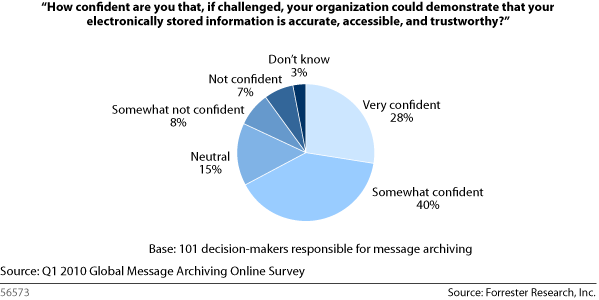Microsoft Exchange Server 2010 SP1 Will Deliver Improved Archiving And eDiscovery
Earlier this month, Microsoft disclosed details on Exchange Server 2010 Service Pack 1 (SP1) slated to ship later this year. Among the various fixes and improvements outlined in the announcement, Microsoft’s plans for archiving and eDiscovery enhancements caught my attention. Earlier this year, I wrote about Microsoft “dipping its toe” into these waters with the initial release of Exchange 2010, and am encouraged that the vendor is taking the market’s message archiving needs seriously with some promising, incremental steps.
Some of the key archiving message archiving advances planned for SP1 are:
- Storage flexibility for a user’s Personal Archive. With the initial release of Exchange 2010, Personal Archives can only be stored in the same mailbox database as the original mailbox. SP1 will introduce the ability to provision a user's Personal Archive to a different mailbox database from their primary mailbox, supporting tiered storage options for archived mail.
- Support for access to a user's Personal Archive with Outlook 2007. In the currently shipping version of Exchange 2010, organizations need either Outlook 2010 or OWA to view archived content. The planned additional client flexibility will be a plus for many, but keep an eye on timing since the announcement states that this will be available in the “SP1 timeframe” (allowing for some vendor wiggle room) and note that Personal Archive functionality in Exchange 2010 currently requires Enterprise CALs.
- Improved PST ingestion. Exchange 2010 SP1 will enable organizations to import historical e-mail data from .PST files directly into Exchange, rather than having to go through the primary mailbox. While this represents an improvement, this forthcoming offering won’t provide native capabilities to crawl enterprise networks, automatically ingesting .PST files into an archive.
In addition to these improvements, Microsoft plans a number of other Exchange 2010 SP1 advances to bolster retention, search, and other functionality that will support organizations’ legal risk mitigation objectives. These are steps in the right direction – many firms are struggling with eDiscovery. In Forrester’s Q1 2010 Global Message Archiving Online Survey, message archiving stakeholders reported low eDiscovery confidence. Only 28% of message archiving stakeholders report that they are "very confident" that if challenged their organization could demonstrate that their electronically stored information (ESI) is accurate, accessible, and trustworthy.

That’s grim. Message archiving deployment shortcomings with retention management and preservation contribute to major eDiscovery challenges. Rising volumes of content and an expanding array of electronically stored information combined with increasing litigation, staff shortages, limited integration with key applications, and other factors also lead to low confidence and considerable expense during the eDiscovery process.
For over a decade, tens of thousands of organizations have deployed message archiving solutions. Over two dozen vendors, providing archiving offerings for Exchange, Notes Domino, and other messaging systems, have helped these buyers comply with regulations, mitigate legal risk, and improve operational efficiency. Although this is a mature market supported by a broad array of vendors, solution satisfaction rates are low. Less than half of message archiving stakeholders report satisfaction with their current message archiving solutions.
So, will Microsoft Exchange 2010 SP1 fully address organizational needs for message archiving and eDiscovery? Is Microsoft seeking to knock out current providers of message archiving solutions? The answer on both counts is a clear “no.” Microsoft continues to partner with a broad ecosystem of message archiving and eDiscovery vendors. Given that Microsoft’s forthcoming offering has some major shortcomings (e.g., no single instance storage, legal hold limitations, no support for non-Microsoft messaging or other applications like SharePoint, no legal review capabilities, etc.), other technology vendors will remain essential for enterprises pursuing broader legal risk mitigation and archiving objectives.
Exchange 2010 SP1, however, will deliver some important advances on these fronts. For organizations with no message archiving systems in place, the offering will represent a step up. For firms with minimal storage optimization and legal risk mitigation needs, Exchange 2010 SP1 may help meet archiving and compliance objectives. For most organizations, however, third-party archiving and eDiscovery solutions will remain important. In any case, buyers should recognize that the next version of Exchange is just one part of the archiving and eDiscovery puzzle. Firms will also need to deal with related applications, aligning IT, legal and other stakeholders, and standardizing policies workflows to achieve regulatory, legal risk mitigation, and operational efficiency goals.
As early adopters test Exchange 2010 SP1 from archiving and eDiscovery perspectives, I’ll be interested to learn about your experiences. Sent me an email at bhill@forrester.com.
Next month, I’ll be presenting on message archiving trends at Forrester’s IT Forum event in Las Vegas and on Friday, May 14th, 2010 will be joining other Forrester analysts online to discuss how Microsoft’s 2010 offerings, including Exchange, SharePoint, Office, and more will impact information and knowledge management professionals. The event kicks off at 11:00 a.m. Eastern time. If you’d like to learn more or join us, this link includes additional details.